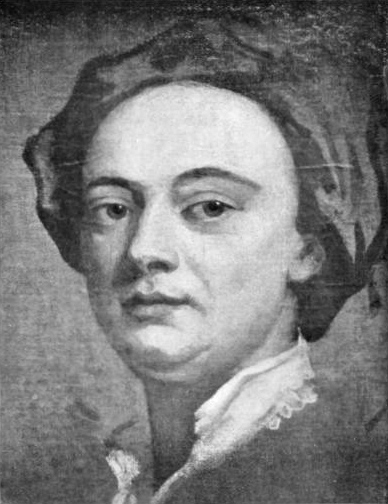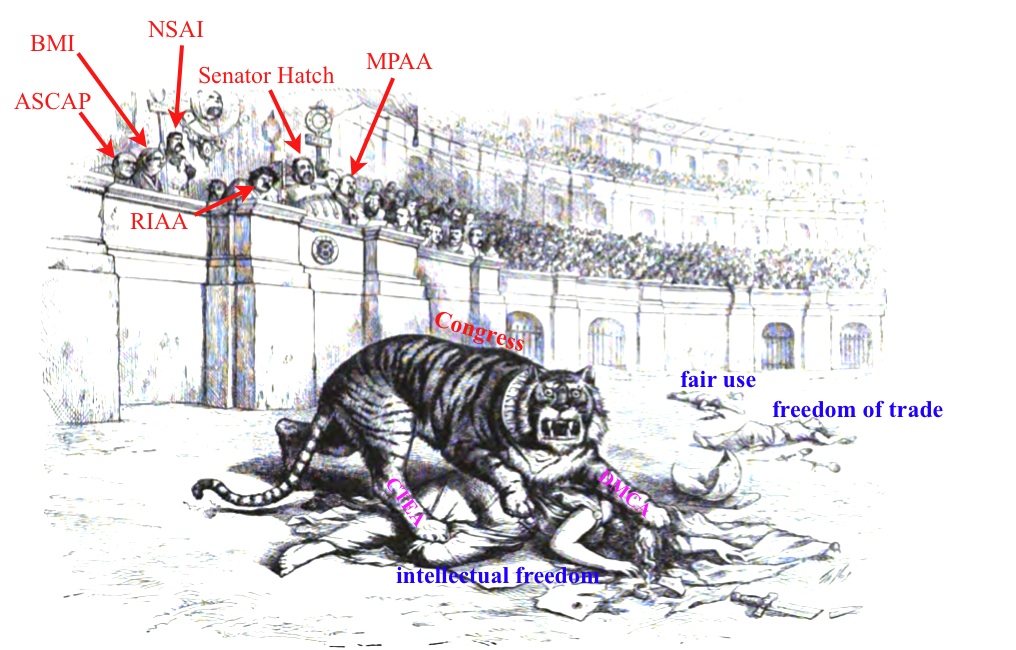I have finally acquired the full text of
Lord Kames's opinion in the important Scots Session case of
Hinton v. Donaldson (Scots Court of Session, 1773). Previously I have had only extracts available to me.
This was the Scottish counterpart to the well-known English case of
Donaldson v. Beckett (House of Lords, 1774) and the American case of
Wheaton v. Peters (33 U.S. 591, 1834), all of which held that copyright is entirely a creature of statute.
Hinton v. Donaldson was the first of these three important cases to be decided.
The first edition of
Thomas Stackhouse's New History of the Holy Bible had been published folio in 1737, though it may have been published in a smaller format earlier. The second edition was published in 1742. Since Stackhouse died in 1752, the copyright in the first edition lasted for 28 years, expiring no later than 1765. (The copyright in the matter new to the second edition would have expired after 14 years, in 1756. Since Stackhouse was no longer alive at the end of this term, under the provisions of the Statute of Anne, the copyright was not renewed. But the matter in the second edition that had been in the first edition was still under the original copyright.) After the expiration of the copyright, Alexander Donaldson, of Edinburgh, brought out a new edition of the work. Hinton filed suit under the theory of "common-law copyright", that is, that copyrights were perpetual under the common law, the Statute of Queen Anne merely reinforcing them. The case was decided by the Scots Court of Session which held 11-1 for Donaldson, rejecting the theory of common-law copyright. The judges delivered their opinions on July 27th, 1773, and judgement was formally entered on July 28.
Voting for Hinton was
Lord Monboddo.Voting for Donaldson were Lord Justice Clerk, Lord Alva,
Lord Auchinleck, Lord Coalston, Lord Elliock, Lord Gardenston,
Lord Hailes, Lord Kames, Lord Kennet, Lord Pitfour, and Lord Stonefield.
Hinton's complaint, the Judges' opinions, and the court order were published by
James Boswell (who was one of Donaldson's counsel) in early 1774 under the title
The Decision of the Court of Session upon the Question of Literary Property in the Cause of John Hinton of London, Bookseller, Pursuer; against Alexander Donaldson and John Wood, Booksellers in Edinburgh, and James Meurose, Bookseller in Kilmarnock, Defenders. This pamphlet may have been available to the English Lords at the time they were hearing the case of
Donaldson v. Beckett.Though in one place Kames expresses what may be deemed an aristocratic disdain of those who write for money, this does not impeach even the part of his opinion in which it occurs, though those who hate the public domain might wish to claim that it does. Kames plausibly holds that if every book ever written were under copyright, the market for books would contract and there would be less work for writers.
Kames's "Goths and Vandals" remark may be said to exaggerate the deadweight losses that copyright imposes on the book trade. But that these deadweight losses exist is beyond doubt. Kames rightly sees that a competitive market for editions of a book is better than a monopolistic one.
Lord Kames's opinion follows here.
======
LORD KAMES. What may be the law of England, with respect to the question at present under deliberation, I pretend not to know. Nor is it necessary that I should know; because an alleged trespass committed in Scotland against the pursuer, and prosecuted for damages in the court of Session, must be determined by the law of Scotland.
I know no foundation for damages, but a breach of contract, which is not pretended in this case; or an injury to one's person or character, which is as little pretended; or a hurt to his property; and this last is the ground upon which damages are claimed.
Let us enquire into the nature of the property here insisted on. The meaning of property, in the laws of all nations, is a right to some corporeal subject, that can be possessed, that can be transferred from hand to hand, that goes to heirs, that may be stolen or robbed, and that may be demanded by a real action, termed
rei vindicatio. The pursuer's right is not of that nature. When a man composes a book, the manuscript is his property: if it be stolen from him, he may demand it by a
rei vindicatio: it may be gifted by him, or sold. But by such gift, or sale, the property is transferred to the purchaser: he has now the same right over it that the composer had originally: he may suppress it, or he may publish it to the world.
What is then the nature of the pursuer's right? He does not pretend to say, that it is a right to any corpus, to any subject that can be possessed, or that can be stolen from him.
Ergo, it is not property. Taking it in all views, no more can be made of it than to be a privilege or monopoly, which entitles the claimant to the commerce of a certain book, and excludes all others from making money by it. The important question then is, from what source is this monopoly derived, a monopoly that endures for ever, and is effectual against all the world? The act of Queen Anne bestows this monopoly upon authors for a limited time upon certain conditions. But our legislature, far from acknowledging a perpetual monopoly at common law, declares that it shall last no longer than a limited time.
But to follow out the common law. The composer of a valuable book has great merit with respect to the public: his proper reward is approbation and praise, and he seldom fails of that reward. But what is it that entitles him to a pecuniary reward? If he be entitled, the composer of a picture, of a machine, and the inventor of every useful art, is equally entitled. Such a monopoly, so far from being founded on common law, is contradictory to the first principles of society. Why was man made a social being, but to benefit by society, and to partake of all the improvements of society in its progress toward perfection? At the same time, he was made an imitative being, in order to follow what he sees done by others. But to bestow on inventors the monopoly of their productions, would in effect counteract the designs of Providence, in making man a social and imitative being: it would be a miserable cramp upon improvements, and prevent the general use of them. Consider the plough, the loom, the spinning wheel. Would it not sound oddly, that it would be rank injustice for any man to employ these useful machines, without consent of the original inventors and those deriving right from them? At that rate, it would be in the power of the inventors to deprive mankind both of food and raiment. The gelding of cattle for food, was not known at the siege of Troy. Was the inventor entitled to a monopoly so as to bar others from gelding their cattle? What shall be said of the art of printing? If the monopoly of this useful art was to be perpetual, it would be a sad case for learned men, and for the interest of learning in general: it would enhance the price of books far beyond the reach of ordinary readers. Such a monopoly would raise a fund sufficient to purchase a great kingdom. The works alone of Shakespeare, or of Milton, would be a vast estate. Te art of making salt water fresh is a very late invention. Was it ever dreamed to be a transgression against property, to use that art without consent of the inventor?
I observe, in the next place, that this claim, far from being founded on property, is inconsistent with it. The privilege an author has by statute, is known to all the world. But I purchase a book not entered in Stationer's hall; does it not become my property? I see a curious machine, the fire engine, for example. I carry it away in my memory, and construct another by it. Is not that machine, the work of my own hand, my property? I buy a curious picture, is there any thing to bar me from giving copies without end? It is a rule in all laws, that the commerce of moveables ought to be free; and yet, according to the pursuer's doctrine, the property of moveables may be subjected to endless limitations and restrictions that hitherto have not been thought of, and would render the commerce of moveables extremely hazardous. At any rate, the author of avery wise or witty saying, uttered even in conversation, has a monopoly of it; and no man is at liberty to repeat it.
Lastly, I shall consider a perpetual monopoly in a commercial view. The act of Queen Anne is contrived with great judgement, not only for the benefit of authors, but for the benefit of learning in general. It excites men of genius to exert their talents for composition; and it multiplies books both of instruction and amusement. And when, upon expiration of the monopoly, the commerce of these books is laid open to all, their cheapness, from a concurrence of many editors, is singularly beneficial to the public. Attend, on the other hand, to the consequences of a perpetual monopoly. Like all other monopolies, it will unavoidably raise the price of good books beyond the reach of ordinary readers. They will be sold like so many valuable pictures. The sale will be confined to a few learned men who have money to spare, and to a few rich men who buy out of vanity as they buy a diamond or a fine coat. The commerce of books will be in a worse state than before printing was invented: at that time, manuscript copies might be multiplied at pleasure; but even manuscript copies would be unlawful if there were a perpetual monopoly. Fashions at the same time, are variable; and books, even the most splendid, would wear out of fashion with men of opulence, and be despised as antiquated furniture. The commerce of books would of course be at an end; for even with respect to men of taste, their number is so small, as of themselves not to afford encouragement for the most frugal edition. Thus booksellers, by grasping too much, would lose their trade altogether; and men of genius would be quite discouraged from writing, as no price can be afforded for an unfashionable commodity. In a word, I have no difficulty to maintain that a perpetual monopoly of books would prove more destructive to learning, and even to authors, than a second irruption of Goths and Vandals. And hence with assurance I infer, that a perpetual monopoly is not a branch of the common law or of the law of nature. God planted that law in our hearts for the good of society; and it is too wisely contrived to be in any case productive of mischief.
Our booksellers, it is true, aiming at present profit, may not think themselves much concerned about futurity. But it belongs to judges to look forward; and it deserves to be duly pondered whether the interest of literature in general ought to be sacrificed to the pecuniary interest of a few individuals. The greatest profit to them ought to be rejected, unless the monopoly be founded in common law beyond all objection: the most sanguine partisan of the booksellers will not pretend this to be the case. At the same time, it will be founded upon the strictest examination, that the profit of such a monopoly would not rise much above what is afforded by the statute. There are not many books that have so long a run as fourteen years; and the success of books upon the first publication is so uncertain, that a bookseller will give very little more for a perpetuity, than for the temporary privilege bestowed by the statute. This was foreseen by the legislature; and the privilege was wisely confined to fourteen years; a sufficient encouragement to men of genius without hurting the public interest. The best authors write for fame: the more diffused their works are, the more joy they have. The monopoly then is useful only to those who write for money or for bread, who are not always of the most dignified sort. Such writers will gain very little by the monopoly; and whatever they may gain a present, the profits will not be of long endurance; a monopoly would put a final end to the commerce of books in a few generations. And therefore, I am for dismissing this process as contrary to law, as ruinous to the public interest, and as prohibited by the statute.






